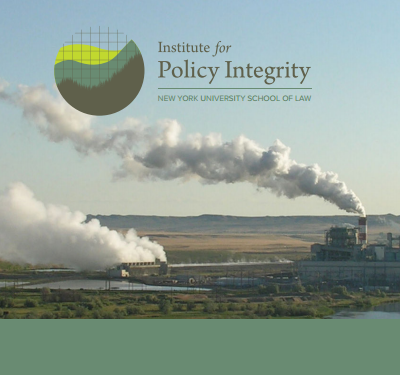December 31, 2016
December 2016 at Policy Integrity: Brief for Carbon Standards Lawsuit; California Air Resources Board Comments; Revesz on Social Cost of Carbon Battle; Distributed Energy Valuation; Energy Storage
-

Brief Supporting Carbon Standards for New Power Plants
The EPA’s Carbon Pollution Standards for New Power Plants limit carbon dioxide emissions from new, modified, and reconstructed fossil fuel-fired plants. A group of state attorneys general and energy companies filed suit challenging the standards, contending that they are arbitrary because they have no benefits and substantial costs. We submitted a brief in the case, showing that the challengers’ claim is contradicted by EPA’s cost-benefit analysis. Depending on future market conditions, the standards will either create substantial benefits that, under all but the most unlikely scenarios, outweigh their costs, or they will have both negligible benefits and negligible costs. Because there are plausible scenarios under which the standards will generate substantial reductions in carbon pollution, they serve an important risk-management function, as do a large number of prior regulations from EPA and other agencies that similarly address unexpected but harmful future events.
-

California Air Resources Board Comments
Policy Integrity is expanding its focus on state-level climate policy, and we recently submitted our first-ever comments to California policymakers. This summer, California extended its greenhouse gas emissions reduction program to 2030, and the Air Resources Board (ARB), the state agency responsible for regulating air pollution, released a preliminary draft for its plans to meet these new targets. We submitted comments on the December 2016 draft, making recommendations on how the “social cost of greenhouse gases” should be used in planning in accordance with recent legislation. We recommend that ARB use the federal social costs of carbon, methane, and nitrous oxide estimates and update these values over time, consistent with the best available science and economics. We also recommend that ARB incorporate cost-benefit analysis into the scoping plan to account for the avoided social costs of the greenhouse gas emissions reduction program.
-

In the News: Revesz on Social Cost of Carbon Battle
In the wake of the election, speculation has swirled about how existing climate policies might be altered. The Washington Post recently explored one potential battleground between economists and the Trump administration: the federal Social Cost of Carbon (SCC), which federal agencies use to estimate the economic impact of climate change and evaluate policies that affect greenhouse gas emissions. Richard Revesz told the Post that efforts to weaken the SCC without economic and scientific justification, either by banning its use in federal policy or decreasing the dollar amount of the federal SCC value, would “likely be struck down in court as arbitrary and capricious.” Revesz also discussed the National Academies of Sciences’ soon-to-be-released review of the SCC, and how current scientific consensus actually supports a higher SCC value.
-

Distributed Energy Valuation Methods: Comments to New York
The New York State Public Service Commission’s “Reforming the Energy Vision” initiative, an effort to modernize New York’s electricity policy, seeks to integrate distributed energy resources (DERs) into the state’s energy supply. The Commission recently sought proposals on how to compensate these producers of electricity for the full value that they provide to the electric grid, and we submitted joint comments with the Environmental Defense Fund on an appropriate valuation methodology. We encourage the Commission to include the full range of environmental benefits of DER, such as reduced air pollution, and to ensure consistency across the Commission’s other programs and across all technologies. This work builds on our earlier comments on unbundling price signals to compensate DER for the time-based, locational, and environmental benefits they provide.
-

On the Docket: Energy Storage
In recent years, energy storage technologies have advanced rapidly while their manufacturing costs have plummeted. Given this trend, many analysts have cited storage technologies’ ability to cut greenhouse gas emissions by helping more intermittent renewable generation connect to the grid. While storage can potentially help meet climate goals, storage deployment could have unintended effects if policies are not designed well. Richard Revesz and Burcin Unel are working on an article that examines how to avoid these potentially pernicious effects. In the coming months, we will publish this research, which will also suggest new policy approaches that would help society better capture the benefits of storage.
